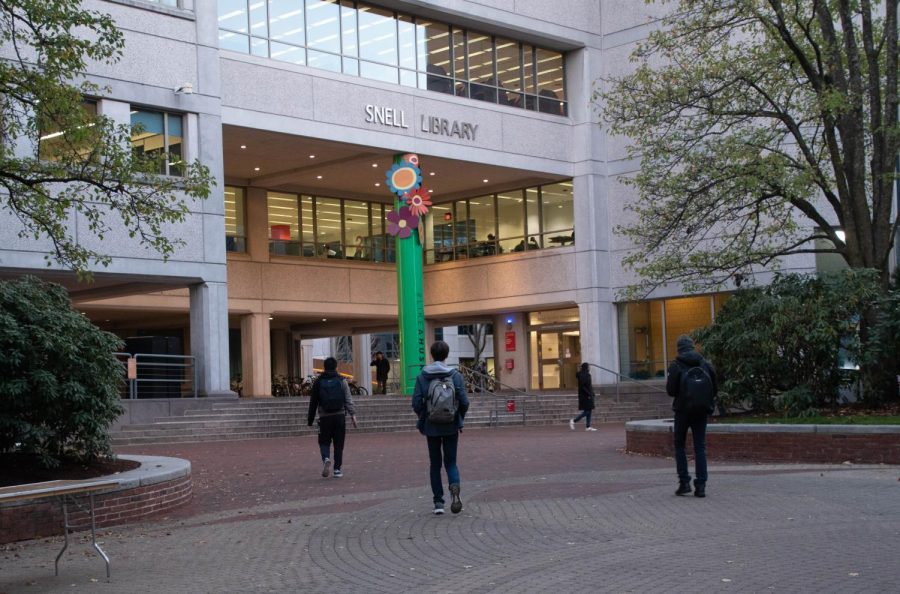Snell to remodel interior, reintroduce books to library in two-year renovation
Snell Library will undergo top-to-bottom renovations beginning in Spring 2023. The library plans to reinstate high-used and archived books in person for student use, as well as create additional study spaces.
November 30, 2022
Although Snell Library is one of the most popular study spots on campus, one thing sets it apart from many other university libraries — its lack of books.
Dan Cohen, the dean of the library, said the last time Snell had a large collection of books was in early 2020, right before the COVID-19 pandemic. These collections primarily took up the third and fourth floors of the library, with the fourth floor being all books and only about 200 seats, compared to today’s 800.
During the pandemic, in an effort to reduce the spread of COVID-19 through touching physical books, Northeastern removed and relocated all of the library’s books, using the empty space to create extra space between desks. However, Cohen said Snell Library had begun removing some of its books in 2018 after a statistical analysis done by the university found that many of the physical archives in the library were not being used by students.
Some Northeastern students who spoke with The News disagree with the university’s decision to remove the books from the library. Elias Kern, a third-year politics, philosophy and economics major, said he feels Northeastern lacks a major resource by not having any books in the library.
“We could really use some books in our library,” Kern said. “I didn’t order a book that I needed for class from the Annex in time and I had to end up listening to 12 hours of an audiobook because the book arrived from the Annex the day after I was supposed to have read it for class. … It wouldn’t have been an issue if there was a library with the book.”
This is not Kern’s only issue with the library. In addition to students not having access to these resources, the lack of books in Snell also affects the general vibe of the library, he said. The current set-up of the library is not particularly conducive to doing one’s best work, and definitely not conducive to collaboration, Kern said.
“A library is generally defined as something that has a lot of books in it. Snell is more of a workspace, computer lab, … an academic version of an assembly line, where everyone is kind of just doing their own little thing and typing away,” Kern said.
To the benefit of students like Kern who appreciate an environment with access to books, the library is undergoing renovations over the next two years to make it a more comfortable study space for a diverse array of students, according to Cohen. Through these renovations, students will see the return of high-use books into the building.
“We’re really having a once in a generation, top-to-bottom modernization of the library,” Cohen said. “We’re quite literally starting at the top and we’ll go all the way through the bottom. … It’s a really unique opportunity to give the entire library a really fresh and forward-looking design.”
In an Oct. 20 email statement to The News, Kerry Vautour, a member of Snell’s communication team, said the renovation will provide “compelling views, inside and out,” with a glass-enclosed central staircase and wrap-around glass façade on the first floor. Additionally, Vautour wrote that the redesign will have “more space to highlight our unique archives and special collections” and provide “on-site access to high-use books.”
Cohen said that in the five years he has been dean of the library, he has witnessed it evolve alongside the university.
“There was the launch of the Digital Media Commons on the second floor, the building of the recording studios, 3D printing, … recognition of the role of computers and digital media and technology in what we do to learn and do independent work and research,” Cohen said.
Northeastern is working with MGA Partners, a boutique architecture firm from Philadelphia, on the renovation to make each floor more coherent and themed.
“They’re doing an amazing job using all kinds of new materials that haven’t been in the building much,” Cohen said. “There’ll be consistency in the design from top to bottom so it will really feel fully unified.”
The renovation will add seating to provide students with more study spaces, especially around the building’s perimeter and soon-to-be glass walls where there is more natural light, according to Cohen. In addition, designers will create more collaborative and independent bookable study rooms and the library’s basement archives will function as a study space with added desks.
For book-loving students, the university will return 40,000 archived books to the building, in addition to the 700,000 books available upon online request and 1.4 million e-books.
“We’ve done a lot of work with varying the furniture so that students can find the kind of seating that they’re comfortable in, but we wouldn’t have that opportunity unless we had the floor space,” Cohen said. “But we also know that there are good reasons to have direct access to books. … So there’ll be a nice type collection that will be returned to the building.”
While the university will be providing students with a full array of reading material and study spaces, one of the central goals of this renovation is to provide accommodating study spaces for a variety of students with different study styles, Cohen said.
Still, the desire for a more traditional library remains for some.
“Snell, and I guess a lot of Northeastern, … tries to make their workspaces really fancy, but there’s something nice about being in a place where there’s a lot of books, even if it’s not visually that sleek or high-tech looking,” Kern said. “I feel like, at the very least, you should have a floor that’s dedicated to having books.”


















